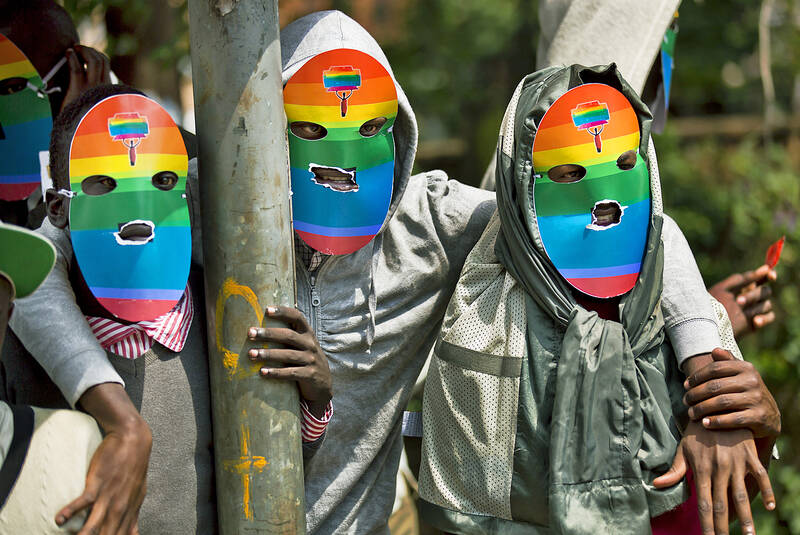LGBTQ refugees and asylum seekers in Kenya are victims of severe hate crimes and abuses, including rape, a report released yesterday by Amnesty International and a Nairobi-based gay rights group said.
Kakuma Refugee Camp in northwestern Kenya hosts more than 200,000 refugees and asylum seekers, including hundreds of LGBTQ people who experience “extreme discrimination and violence,” Amnesty and the National Gay and Lesbian Human Rights Commission said.
Perpetrators are able to “commit their crimes with almost total impunity, enabled by inaction on the part of the authorities,” they added.

Photo: AP
Researchers interviewed 41 people from 2018 to February who described facing “hate crimes, violence, including rape, and other serious human rights abuses.”
Esther, a 41-year-old lesbian, told researchers that she was raped twice in 2018 in the camp, the first time by two men threatening her with a knife, and the second time by four men during a burglary “in the presence of her seven-year-old son.”
Another lesbian, Winnie, said her shop was destroyed by vandals who also injured one of her children.
She said that police had done little to help her apprehend those responsible.
Such incidents showed that the camp, which is run by the UN High Commissioner for Refugees, was “not yet safe for asylum seekers and refugees” who are LGBTQ, the report said.
The community faces “discrimination as well as homophobic and transphobic attitudes from government officials, the police and other service providers,” Amnesty executive director for Kenya Irungu Houghton said.
“This is often reflected in delays to the processing of their asylum claims, harassment, violent homophobic attacks, threats, intimidation and extremely limited opportunities for local integration or third-country resettlement,” Houghton said.
The Kenyan government must “urgently ensure the physical and psychological safety” of all LGBTQ asylum seekers and refugees in the Kakuma camp, the report said.
The report comes as the LGBTQ community finds itself under attack in Kenya and neighboring countries, with governments and politicians taking an increasingly harsh line on same-sex activity.
Kenyan President William Ruto, a born-again Christian elected in August last year, in March said that same-sex marriages could “happen in other countries, but not in Kenya.”
Homosexuality is a Western import that Kenya’s “customs, traditions, Christianity and Islam cannot allow,” he said.
Gay sex is a crime under colonial-era laws in the East African nation. Penalties include prison terms of up to 14 years.
However, Kenya is the only nation in East Africa and the Horn region to offer “asylum to individuals who seek protection because of their sexual orientation, gender identity and/or expression and sex characteristics,” the report said.

Kehinde Sanni spends his days smoothing out dents and repainting scratched bumpers in a modest autobody shop in Lagos. He has never left Nigeria, yet he speaks glowingly of Burkina Faso military leader Ibrahim Traore. “Nigeria needs someone like Ibrahim Traore of Burkina Faso. He is doing well for his country,” Sanni said. His admiration is shaped by a steady stream of viral videos, memes and social media posts — many misleading or outright false — portraying Traore as a fearless reformer who defied Western powers and reclaimed his country’s dignity. The Burkinabe strongman swept into power following a coup in September 2022

‘FRAGMENTING’: British politics have for a long time been dominated by the Labor Party and the Tories, but polls suggest that Reform now poses a significant challenge Hard-right upstarts Reform UK snatched a parliamentary seat from British Prime Minister Keir Starmer’s Labor Party yesterday in local elections that dealt a blow to the UK’s two establishment parties. Reform, led by anti-immigrant firebrand Nigel Farage, won the by-election in Runcorn and Helsby in northwest England by just six votes, as it picked up gains in other localities, including one mayoralty. The group’s strong showing continues momentum it built up at last year’s general election and appears to confirm a trend that the UK is entering an era of multi-party politics. “For the movement, for the party it’s a very, very big

ENTERTAINMENT: Rio officials have a history of organizing massive concerts on Copacabana Beach, with Madonna’s show drawing about 1.6 million fans last year Lady Gaga on Saturday night gave a free concert in front of 2 million fans who poured onto Copacabana Beach in Rio de Janeiro for the biggest show of her career. “Tonight, we’re making history... Thank you for making history with me,” Lady Gaga told a screaming crowd. The Mother Monster, as she is known, started the show at about 10:10pm local time with her 2011 song Bloody Mary. Cries of joy rose from the tightly packed fans who sang and danced shoulder-to-shoulder on the vast stretch of sand. Concert organizers said 2.1 million people attended the show. Lady Gaga

SUPPORT: The Australian prime minister promised to back Kyiv against Russia’s invasion, saying: ‘That’s my government’s position. It was yesterday. It still is’ Left-leaning Australian Prime Minister Anthony Albanese yesterday basked in his landslide election win, promising a “disciplined, orderly” government to confront cost-of-living pain and tariff turmoil. People clapped as the 62-year-old and his fiancee, Jodie Haydon, who visited his old inner Sydney haunt, Cafe Italia, surrounded by a crowd of jostling photographers and journalists. Albanese’s Labor Party is on course to win at least 83 seats in the 150-member parliament, partial results showed. Opposition leader Peter Dutton’s conservative Liberal-National coalition had just 38 seats, and other parties 12. Another 17 seats were still in doubt. “We will be a disciplined, orderly